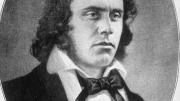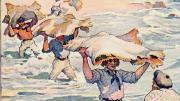Richard Henry Dana Jr. A.B. 1837, LL.B. ’39, LL.D. ’66, survives in modern memory as the author of Two Years Before the Mast. But his literary legacy alone sells him short, Jeffrey L. Amestoy argues in Slavish Shore (Harvard, $35), the first full biography in more than half a century. Indeed, the voyage he undertook and recorded fired Dana (see Vita, March-April 1998, page 48) with hatred not only of the maltreatment of sailors, but also of slavery and other injustices—causes he addressed as a lawyer. Amestoy, M.P.A. ’82, a former chief justice of the Vermont Supreme Court, is the ideal extra-literary biographer. From the introduction to his account of Dana’s “odyssey”:
On an August day in 1834 a slight, nearsighted boy boarded a ship he had never seen before, joined a crew to whom his aristocratic family would have never spoken, and sailed where few Americans had ever been. The ship might have vanished with the forgotten lives of its sailors. Richard Henry Dana Jr.’s classic, Two Years Before the Mast, immortalized the harrowing voyage from Boston around Cape Horn to the remote coast of California. But when Dana witnessed the sadistic flogging of his shipmates, it prompted more than one of the most compelling scenes in American literature. It was the genesis of his vow to stand for justice. This is the story of how Dana kept his promise in the face of the most exclusive and powerful establishment in America—the Boston society in which he had been born and bred.
The drama of Dana’s remarkable life arises from the unresolved tension between the man he became at sea and the Brahmin he was expected to be on shore. The qualities—courage, integrity, and a sense of justice—that led to his acceptance as a common sailor before the mast were the traits least valued by his peers. “He was counsel of the sailor and the slave,” wrote Charles Francis Adams Jr. [A.B. 1856, LL.D. ’95], “courageous, skillful but still the advocate of the poor and unpopular.…In the mind of wealthy and respectable Boston almost anyone was to be preferred to him.”
Dana first broke with convention when he left Harvard to ship as a common seaman. He represented sailors, angering Boston’s ship owners. He defended fugitive slaves and their rescuers when the “best people” believed opposition to the Fugitive Slave Act was treasonous. His brilliant argument before the U.S. Supreme Court preserved Lincoln’s authority to carry on the Civil War. He was the special prosecutor who indicted Jefferson Davis for treason—and prompted the president to end the prosecution.
No lawyer of equivalent standing did as much on behalf of fugitive slaves and those who aided them, nor paid a higher price for doing so. Dana was socially ostracized, boycotted, and nearly murdered.…George Ticknor [LL.D. 1850], social arbiter of Brahmin Boston, wrote to Dana that they were never to speak again.









